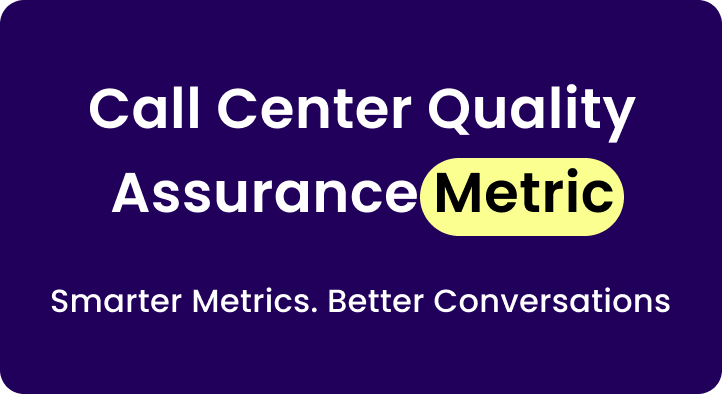Turnover is one of the biggest headaches in contact centers.
Hiring is expensive. Training takes time. And just when an agent gets good, they leave.
AI won’t magically fix this, but it can absolutely help. When used right, it makes agents’ jobs less frustrating, coaching more useful, and performance more visible. That’s a recipe for better retention.
Let’s look at how it works.
1. AI gives agents better feedback, faster
One reason agents leave?
They don’t get enough feedback, or worse, they only hear about what went wrong weeks later.
AI changes that.
It can analyze every call, flag patterns, and surface feedback within hours, not days or weeks. Agents don’t have to wait for random scorecards. They can see where they’re doing well and where they need to improve, while it’s still fresh.
When people get timely, fair feedback, they feel more in control. That builds confidence and loyalty.
2. It removes the guesswork from coaching
Let’s be honest: coaching often feels reactive.
Managers sit with a few calls, give some tips, and move on.
But AI can track every interaction and tell you exactly where an agent struggles, maybe it’s handling objections, sounding empathetic, or remembering to verify details.
Instead of generic coaching, you can now give targeted, personalized support. That shows agents you’re invested in their growth and helps them get better, faster.
And when people feel like they’re improving, they’re far more likely to stick around.
3. It helps spot burnout early
Sometimes, the signs are there, rising handle times, lower sentiment scores, and more escalations, but no one sees them until it’s too late.
AI can surface those red flags early.
It picks up changes in behavior, tone, or customer frustration levels. It can show which agents are handling tougher calls or working through more negative interactions than others.
Managers can step in before burnout becomes resignation.
A simple check-in at the right time can save a good agent.
4. It creates a fairer, more transparent work environment
Agents often feel that QA is unfair, especially if just a handful of calls are reviewed each month.
AI fixes that by scoring every interaction, not just the ones manually picked. That means everyone is held to the same standard. Bias goes down. Trust goes up.
When agents feel they’re being judged fairly, they’re less likely to get frustrated and leave.
5. It reduces repetitive, soul-crushing tasks
Let’s face it, no one enjoys writing call notes or logging the same thing 40 times a day.
AI can handle things like:
- Call summaries
- Post-call dispositioning
- Script checks
- CRM field updates
This gives agents more time to actually connect with customers. And it reduces the mental fatigue that leads to churn
Happy agents = better service = less turnover.
6. It gives high performers a clear path to grow
Not all agents want to stay on the phone forever. Some want to become team leads, QA analysts, or trainers.
AI gives managers the data to spot rising stars, agents who consistently perform well, improve over time and handle complex issues with ease.
You can use that data to guide promotions and growth paths. When people see there’s room to grow, they’re more likely to stay.
7. It helps build a culture of continuous improvement
Retention isn’t just about salary or perks.
It’s about culture, and whether people feel like they’re learning, supported, and set up to succeed.
AI helps teams build that kind of environment.
Not with one-off fixes, but by making feedback, coaching, and development part of the everyday workflow.
It shifts the focus from “Who messed up this call?” to “How do we help everyone get better?”
That’s the kind of team people want to be part of.
Conclusion
AI can’t fix a toxic culture. It won’t make bad managers better.
But used the right way, it becomes a retention engine, helping you coach smarter, support faster, and build trust at scale.
So no, AI doesn’t just help your numbers.
It helps your people. And that’s what keeps them around.



